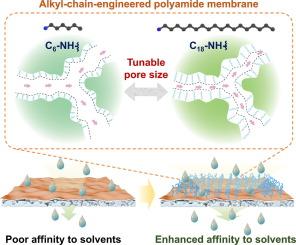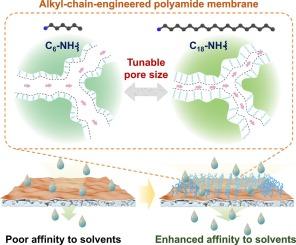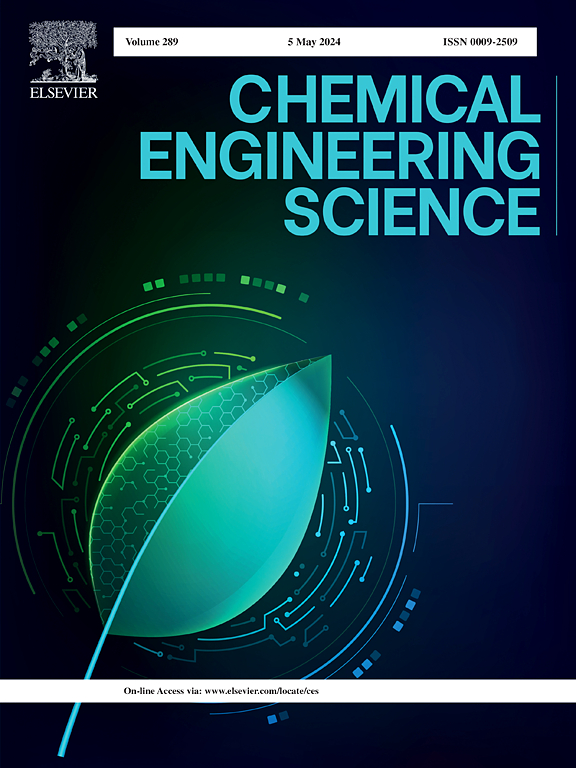Rapid solvent transport and tunable molecular sieving enabled by ultrathin alkyl-chain-engineered polyamide membranes
IF 4.1
2区 工程技术
Q2 ENGINEERING, CHEMICAL
引用次数: 0
Abstract
Organic solvent nanofiltration (OSN) has emerged as a promising separation technology for the chemical and pharmaceutical industries due to its low energy consumption and eco-friendliness. However, traditional polyamide-based membranes used in OSN often exhibit low permeance for organic solvents and it is difficult to precisely control the pore structure. In this study, we report a facile approach to fabricate ultrathin alkyl-chain-engineered polyamide nanofilms via free-standing interfacial polymerization for high-performance selective separations. The membranes were prepared via a “two birds one stone” strategy, enabled by post-treatment in aliphatic amine solution, simultaneously regulating the pore size and optimizing the membrane chemical property. This enables the membrane with high solvent permeance, especially for non-polar solvents (heptane at ∼22.2 L m−2h−1 bar−1, toluene at ∼16.8 L m−2h−1 bar−1), while maintaining excellent molecular sieving capability. Notably, the molecular weight cut-off (MWCO) can be regulated by introducing alkyl chains of varying lengths to their pores. The exceptional solvent permeance and tunable molecular sieving property make the membranes promising for high value-added products purification in the pharmaceutical industry and crude oil separation.


超薄烷基链工程聚酰胺膜可实现快速溶剂传输和可调分子筛分
有机溶剂纳滤(OSN)因其低能耗和生态友好性,已成为化学和制药行业一项前景广阔的分离技术。然而,OSN 中使用的传统聚酰胺基膜通常对有机溶剂的渗透率较低,而且难以精确控制孔隙结构。在本研究中,我们报告了一种通过自由界面聚合法制造超薄烷基链工程聚酰胺纳米膜的简便方法,可用于高性能选择性分离。膜的制备采用了 "一石二鸟 "的策略,即在脂肪族胺溶液中进行后处理,同时调节孔径和优化膜的化学性质。这使得膜具有较高的溶剂渗透率,特别是对非极性溶剂(庚烷的渗透率为 ∼22.2 L m-2h-1 bar-1,甲苯的渗透率为 ∼16.8 L m-2h-1 bar-1),同时保持了出色的分子筛分能力。值得注意的是,可以通过在孔中引入不同长度的烷基链来调节截留分子量(MWCO)。出色的溶剂渗透性和可调的分子筛分性能使这种膜有望用于制药业的高附加值产品提纯和原油分离。
本文章由计算机程序翻译,如有差异,请以英文原文为准。
求助全文
约1分钟内获得全文
求助全文
来源期刊

Chemical Engineering Science
工程技术-工程:化工
CiteScore
7.50
自引率
8.50%
发文量
1025
审稿时长
50 days
期刊介绍:
Chemical engineering enables the transformation of natural resources and energy into useful products for society. It draws on and applies natural sciences, mathematics and economics, and has developed fundamental engineering science that underpins the discipline.
Chemical Engineering Science (CES) has been publishing papers on the fundamentals of chemical engineering since 1951. CES is the platform where the most significant advances in the discipline have ever since been published. Chemical Engineering Science has accompanied and sustained chemical engineering through its development into the vibrant and broad scientific discipline it is today.
 求助内容:
求助内容: 应助结果提醒方式:
应助结果提醒方式:


